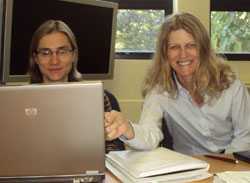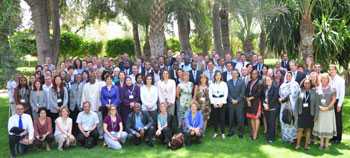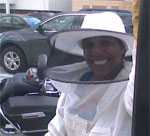OD News and Staff Notes
This website is archived for historical purposes and is no longer being maintained or updated.
July 24, 2012: Content on this page kept for historical reasons.
In This Issue
Division of Bacterial Diseases (DBD) News Bulletin
Summer 2012
Kathy Tatti is the recently elected president of the CDC Chapter of Sigma Xi. The 125 year old international honor society of science and engineering, whose members are elected based on their research potential or achievements focuses on facilitating public understanding of science, enhancing the health of the research enterprise and engaging in transformational education. Kathy is working with CDC’s 90 members to promote these scientific objectives by annually sponsoring a vaccine dinner club at CDC, hosting a scientific lunch and learn program and working with the bioinformatics seminar series. The group annually awards the Walter R. Dowdle Award for Achievement in Public Health Science. DBD’s Sandy Martin is the group’s secretary. Learn more about Sigma Xi.

Elizabeth Zell with Claire von Mollendorf from the Centre for Respiratory Diseases and Meningitis (CRDM) in Johannesburg, South Africa; Claire is learning to use IVEware to multiply impute for missing data. Adjusting for missing information on HIV status is needed for monitoring pneumococcal disease trends through the GERMS surveillance system.
Elizabeth Zell was recently in Johannesburg, South Africa working on two observational studies to assess the impact of pneumococcal conjugate vaccine. One evaluates the impact for invasive pneumococcal disease and the other evaluates the impact for presumed bacterial pneumonia. While there, Elizabeth gave a seminar on missing data and discussed multiple imputation as the best option for dealing with missing data to a group of medical officers. Elizabeth has been invited to give a course on the analysis of missing data at the Second Joint Biostatistics Symposium in Beijing, China in July.
Gina Mootrey was a representative to the March 2012 International Conference on Emerging Infectious Diseases (ICEID) Scientific Program Committee, co-convener of 2 panel sessions, an abstract reviewer, and member of the Leaders Program Review Panel that awards travel and conference grants to representatives from resource-limited countries to attend the conference in an aim to enhance infectious disease prevention globally. The conference brings together public health professionals to exchange scientific and public health information on global emerging infectious disease issues. Active Bacterial Core pneumococcal surveillance data was featured in 8 oral and poster presentations.
Rana Hajjeh attended the April Nigerian National Vaccine Summit in Abuja, Nigeria. The high level meeting of national and international delegates, including the First Lady of the Federal Republic of Nigeria that was organized to join forces with the international community to expand vaccine access nationwide with the goal of achieving universal vaccine coverage for all Nigerian children by the year 2015. Over one million Nigerian children under age 5 die annually from vaccine-preventable diseases.
Amanda Cohn, Rana Hajjeh, and Chris Van Beneden participated in the WHO annual NUVI meeting (New and Underutilized Vaccines) meeting in Marrakech, Morocco in May. Chris presented the talk "Measuring the impact of Streptococcus pneumoniae and Haemophilus influenzae type b conjugate vaccination: An introduction to WHO’s Vaccine Impact Manual" and Rana was part of an expert panel that discussed vaccine introduction in low middle income countries. See photo at right.

Global Meeting on Implementing New and Underutilized Vaccines
The Epidemic Intelligence Service (EIS) hosted its 2012 annual scientific conference for the national and international public health community in April in Atlanta. DBD recruited and matched with four new EIS Officers. Completing the two year post-graduate training program of service and on-the-job learning in the practice of applied epidemiology in the Respiratory Disease Branch are Alicia Demirjian, a graduate of the American University of Beirut and Aaron Harris, a graduate of Tufts University while Hajime Kamiya, a graduate of the Mie University School of Medicine and Stephen Ko, a graduate of the Medical College of Georgia will be stationed in the Meningitis and Vaccine Preventable Diseases Branch.
DBD staff supports a global health emergency—Polio Eradication Since April, Stephen Hadler has been working in the Polio Eradication Emergency Operations Center (EOC) as Team Lead for the Eastern Mediterranean Region helping to guide CDC support for Pakistan and Afghanistan to implement emergency action plans to eradicate polio. Steve recently spent a week in Afghanistan where CDC is working to hire expert national consultants, funding key strategies to reduce polio in high risk southern districts, and on a USAID funded project to improve routine immunization. Steve says about the experience, "It was encouraging to see the unwavering dedication of people from all over the world in Afghanistan to work on eradicating polio—in spite of the constraints and challenges related to security, tribal and trust issues affecting delivery of vaccines in this region of the world—it’s not easy work. It is rewarding for me to use whatever skills I can to help make a difference both in the CDC EOC and in the field." In Pakistan, CDC is expanding the N-STOP program, deploying experts to support WHO Pakistan staff and has plans to deploy up to 50 Pakistan FETP trainees to Pakistan’s highest risk districts in 2013. Other staff from DBD have also been involved on the polio eradication efforts. Sarah Meyer (MVPDB) made two trips – to DRC Congo and Burkina Faso – and Cindy Hatcher (MVPDB) made a trip to DRC Congo.
What’s the Buzz...
 Claressa Lucas, a microbiologist in the Legionella Lab was troubled that her little urban garden in non-incorporated DeKalb County was not yielding the harvest she hoped for....so she ordered some honey bees from a local apiary—through the U.S. mail. The bees rescued her garden and now she proudly shares a bounty of produce along with honey, beeswax, propolis and pollen from 4 beehives with family and friends. In the process, of growing her garden, Claressa became a real beekeeper and 4 year member of the Metropolitan Atlanta Beekeepers Association. So when a swarm of honeybees occupied CDC Health Rider Donnie Powell’s Harley-Davidson bike one afternoon last spring.... people knew just who to call. Claressa came to the rescue and saved CDC staff parked on the top deck of building 16 from an afternoon of honey bee terror. Read the full story.
Claressa Lucas, a microbiologist in the Legionella Lab was troubled that her little urban garden in non-incorporated DeKalb County was not yielding the harvest she hoped for....so she ordered some honey bees from a local apiary—through the U.S. mail. The bees rescued her garden and now she proudly shares a bounty of produce along with honey, beeswax, propolis and pollen from 4 beehives with family and friends. In the process, of growing her garden, Claressa became a real beekeeper and 4 year member of the Metropolitan Atlanta Beekeepers Association. So when a swarm of honeybees occupied CDC Health Rider Donnie Powell’s Harley-Davidson bike one afternoon last spring.... people knew just who to call. Claressa came to the rescue and saved CDC staff parked on the top deck of building 16 from an afternoon of honey bee terror. Read the full story.
- Page last reviewed: July 24, 2012 (archived document)
- Content source:


 ShareCompartir
ShareCompartir